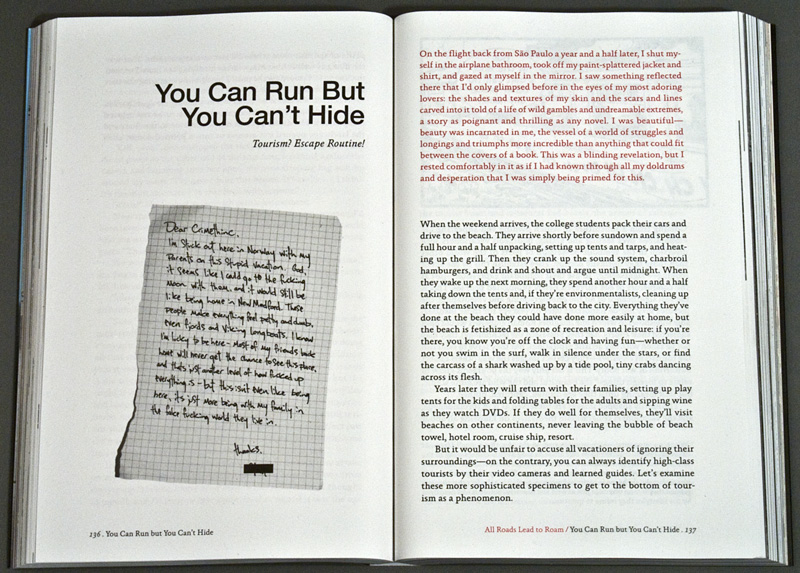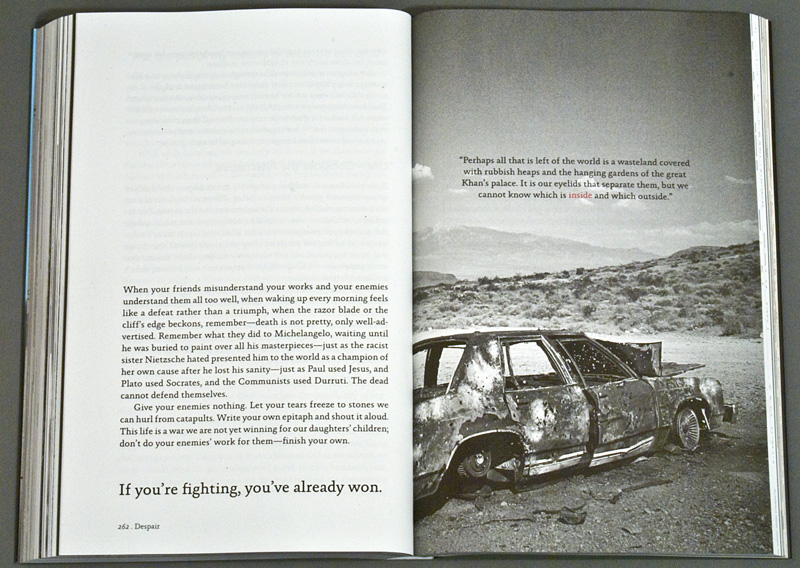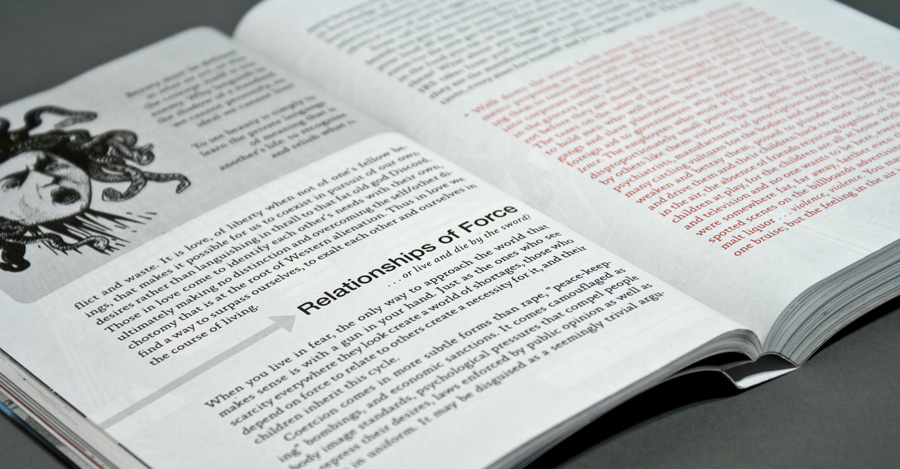Expect Resistance is not one but three books, each of which may be read as a complete work unto itself. The first book, printed in standard black ink, continues the inquiry into modern life and its discontents begun in Days of War, Nights of Love. Just as that book included improved versions of texts originally published between 1996 and 1999, this book draws on CrimethInc. material from 2000 to 2004, painstakingly refined and augmented with a great deal of new content. The second book, in red ink, is a composite account, related by three narrators, of the adventures and tribulations that inevitably ensue when people pursuing their dreams enter into conflict with the world as it is.
Together these comprise a third book, an exploration of the complex relationship between ideals and reality. Expect Resistance is a field manual for a field on which all manuals are useless, a meditation on individual transformation and collective resistance in disastrous times, and a masterpiece that raises the bar for radical publishing.

Gallery image #01 of Expect Resistance : a crimethink field manual

Gallery image #02 of Expect Resistance : a crimethink field manual

Gallery image #03 of Expect Resistance : a crimethink field manual

Gallery image #04 of Expect Resistance : a crimethink field manual

Gallery image #05 of Expect Resistance : a crimethink field manual

Gallery image #06 of Expect Resistance : a crimethink field manual
Reviews
Nothing lacks in either beauty or message on all counts … Epic proportion, insistent proclamation, and impeccable production. A highly readable, enlightened, and insightful 350-page epistle.
Fifth Estate, Summer 2008, #378
Delves into the complexities, consequences and pitfalls of radical activism in a way that other celebratory books about the anti-capitalist movement have shied away from.
The Indypendent, August 2008, #124
Stockholders! Police chiefs! Baristas! Zapatistas! ANARCHISTS!
Read and Reading Tremble
CrimethInc. Launches New Offensive with the Publication of Expect Resistance
They called us bourgeois for urging people to abandon bourgeois culture.
They called us anti-worker for refusing complicity in exploitation.
They dismissed our advocacy of plagiarism as unoriginal.
They mocked us for producing paper bullets,
Then cried foul play when those projectiles hit their targets.
When we subsisted on crusts of bread, they insisted it was the upper crusts;
When we discovered cornucopias of abundance, they preferred their sour grapes.
We’ve been branded militants and dilettantes, black bloc and bête noire, primus inter pariahs.
We reply, as Marie Antoinette might have, that they can have their words and eat them too—like Samuel Clemens, we don’t care what our detractors say about us, so long as they don’t tell the truth.
Long ago, we embarked on the greatest adventure of our lives: the total rejection of hierarchy, submission, and tedium, of status and status quo. Seceding from an entirely colonized world, we cast ourselves as crash-test dummies in a life-or-death mission to smash through the walls of capitalism.
Contrary to all expectations, we’ve survived. To our surprise, we are now able to present Expect Resistance, a coded account of our adventures hitting those walls and a full report on what we found beyond them.
Printed in stunning black and red and bound in the skin of corporate executives, Expect Resistance is the perfect coffee table book for anyone who lives out of a backpack. Our writers have spent years experimenting with every possible extremity of existence; our editors have spent months hammering out imperfections and adding sickles to the periods to turn them into question marks; our designers, as everyone knows, are the best in the business, not to mention the best against it. A thousand sleeper cells across the planet prepare to swing into action as this announcement is typed.
Concerned citizens may object that some of the raw materials from which this book has been assembled have yet to enter the public domain; we ask them to think of Expect Resistance as a book ahead of its time.
To enjoy your very own copy of Expect Resistance, simply commit to a project as ambitious and absurd as our own, blunder obstinately forward for several years, then send a few dollars to CrimethInc. Far East to defray printing and shipping expenses. Better yet, save your money and request a copy at your local library.
Still in love with all of you and the amazing things we have yet to do
– your faithful ex-workers
They will say we refused everything to make a beautiful but utopian negation—as if it were just a work of art we were out to create. They will say that, like generations of nihilists before us, we uttered our grandiose denial and then were driven by it into the wilds of oblivion. They will praise the product—product being their specialty—and deny the evidence. They will imply that we could not have lived—but we do live, we live!—and so we give you these fragments, this poorly charted record, to spit in their faces… or whisper in their ears as they sleep.
A Reviewer’s Guide to Expect Resistance
Some reviews eclipse the object of their study in eloquence, nuance, and insight. Others are reviews to the same extent that bayoneting is a medical operation 1 . It is our hope, of course, that reviews of Expect Resistance will dramatically overshadow the book itself in terms of inventiveness and discernment. In that spirit, allow us to offer some starting points for potential reviewers2:
The Website Review: In this hectic era, when people purchase books as a way of consoling themselves for lacking the time to read them, it is necessary that reviews be as short as possible—both to maximize sales, and to minimize attention spans. For example, scarcely ten years ago, a short review of Expect Resistance might have read:
This unusually formatted book is both a collection of essays, à la the CrimethInc. Collective’s now classic introductory tome Days of War, Nights of Love, and at the same time a novel—one might say the Unbearable Lightness of Being of the antiglobalization movement. It’s arguably a more involved experiment than anything that has come out of the anarchist milieu in a generation, and a more mature statement than previous CrimethInc. projects. While it lacks the bumper-sticker-slogan urgency of Days of War in places, it makes up for that with more layers and depth, not to mention ambiguity. If it’s a field guide, the point must be that there can be no field guide to the most difficult aspects of sustained subversive activity; all the same, they offer enough points of departure to enrich any reader who wants to escape, as the saying goes, “anywhere out of this world.”
–Cienfuegos Libertarian Review of Books, volume 2, issue 38
Properly edited for today’s online readership, this review should read:
“Out of this world.” –clrb.com
The Structural Analysis: For centuries, authors from Tolstoy to Kundera have refined the reflective digression until it has become a staple of the modern novel; one might brush it off as cheating to make this convention appear new by simply printing the digressions in a different color ink. The black texts—the digressions—maintain the format CrimethInc. stole for Days of War from Marshall McLuhan via the Readers and Writers “. . . for Beginners” series. The red texts interweave three narratives, which appear in no particular order but always include a hint from which the reader can deduce which character is speaking.
The Political Analysis: Comparing the text inside the front cover of Expect Resistance to the original version that circulated on a poster in 2001, it is clear that the publishers are taking their project more seriously today—one might even say more grimly. The revolution is no longer an alternate universe that “you can step into . . . any time you like”—now it is “waiting for you to switch sides.” Those who griped that Days of War painted an overly rosy picture of the prospects for would-be revolutionaries will find that Expect Resistance presents the other side of the coin: failure, depression, and repression are all explored in detail as probable, if potentially worthwhile, consequences of romantic idealism.
This is not to say they have given up on revolution—on the contrary. Expect Resistance finds them more focused on the social aspects of revolutionary struggle. While the chapter on capitalism formed the heart of Days of War, and the general program that book offered was refusing to sell oneself, the section on democracy occupies the center of Expect Resistance, and the stories within focus on the efforts of individuals to coexist and collaborate outside the competitive frameworks offered by hierarchical society.
The Philosophical Approach: CrimethInc. publications have long experimented with different approaches to history and the passing of time. Days of War rejected the valorization of the past over the present implied in the modern conception of history, proposing instead the eternal present of mythology. Hunter/Gatherer, by contrast, emphasized just how much of the past persists in the present, and how much the present shapes the past as well as the future.
At the heart of the narrative portion of Expect Resistance, one finds the notion that history is a repeating cycle, yet a cycle that may break off unexpectedly. Although the accounts are clearly based on events from 1996-2006, the credits page at the beginning proclaims “This is neither a true story nor a work of fiction. This is a chronicle of things that are going to happen.” The story is worth telling because it is going to happen again, though perhaps with a different outcome. As one character reflects, following a major setback: “After that, we didn’t deserve another chance. But history always doubles back on itself, trying the same experiments endlessly over until they produce different results.” The future is unwritten indeed.
The Historical Context: This is one of the first serious anarchist texts to attempt to engage with the effects of the September 11 attacks in the US. Through thinly-veiled allegory, it follows the jarring shift from the heady days of resurgent anticapitalism to the despair, malaise, and witch-hunts of the years that followed. Likewise, it hints at paths forward for anarchists today.
The Biblical Allegory: In his Divine Comedy, Dante suggested that the denizens of hell experience time backwards, remembering the future rather than the past. If we are to take the flap inside the front cover at face value, Expect Resistance is a backwards retelling of the creation myth from the book of Genesis, chronicling the overturning of divine judgment and the return of humanity to a state of grace. There are hints that this may be more than a red herring: for example, Cain appears on page 242 to reclaim his innocence, reinterpreting Jesus’ dictum that the last shall be first. If we draw this conceit out further, the apocalypse must precede the first pages of the book, occurring before its protagonists have woken up to the conflicts around and within them: that is to say, the story starts from the end of the world, which we are currently experiencing on endless repeat.
The Marxist Take: The authors seem to see hierarchy as ultimately grounded in psychological and cultural conditions rather than material economic conditions.
Totally Missing the Point: Thor Heyerdahl’s theories about early human migration have largely been discredited!
The Smear Campaign: Check each of these words off as you use it: preachy, repetitive, rehash, naïve, over-generalization, dumpster (double word score), self-aggrandizing, privilege, simplistic, bourgeois.
Judging the Book by its Cover: Turning it over, I was disappointed to find no scandalous quotations; Philadelphia’s Wooden Shoe bookstore will have to find some other pretext for not carrying this! Indeed, the cover design and text are positively opaque—they give the unfortunate who picks up Expect Resistance by chance nothing to go on at all.
The Incisive Denunciation: Perhaps most telling is what is not included. Where, for example, are the punk and do-it-yourself subcultures that have been so important to the genesis and development of CrimethInc.? To leave them out of this story is to present effect without cause—to pretend that activities and values that only make sense within that specific context are universal. Likewise, barring a sentence on page 72, where are the queer and trans people in this story? And, for that matter, the children? Similarly, though several of the protagonists’ mothers appear at some point, no reference is ever made to any of their fathers. Revolutionary anarchists are sometimes accused of making a lifelong project out of rebelling against authoritarian fathers, and one cannot help but wonder what a Freudian psychologist would say about this: the Absent Father returns as the All-Powerful State, perhaps?
The Scavenger Hunt: The CrimethInc. collective’s merry plagiarism recalls Walter Benjamin’s ambition to compose a work entirely comprised of quotations; the ex-workers might counter that every book is comprised entirely of quotations, and they are simply acknowledging this. According to their line of thinking, language itself is comprised of quotations and references—otherwise, it would not serve to communicate at all.
Be that as it may, the wealth of obscure references in this book is a veritable gold mine for those who would prove their erudition. Accordingly, we announce a contest—any reader who can locate at least half of the texts in Expect Resistance adapted from the following sources 3 can name his or her price. Email answers to rollingthunder@crimethinc.com.
Self-styled immediatist Hakim Bey
Irascible gadfly Bob Black
French intellectual Maurice Blanchot
Italian jailbird Alfredo Bonanno
Avowed Ultraist Jorge Borges
Gallery proprietor André Breton
Italian fabulist Italo Calvino
Mathematics lecturer Lewis Carroll
Unknown poet Maarten Das
Gleeful obfuscators Monsieur Dupont
College dropout Max Ernst
Pop musician Peter Gabriel
Tubercular immigrant Khalil Gibran
French Canadians Godspeed, You Black Emperor!
Conservative speechwriter Mark Helprin
German-Swiss writer Hermann Hesse
Hollywood movies Fight Club and The Whole Wide World
MC Immortal Technique
Dropout carpenter Jesus of Nazareth
Baptist minister Martin Luther King, Jr.
Author and filmmaker Laura Kipnis
Conceptual artist Barbara Kruger
Futurist blowhard Filippo Marinetti
Expatriate pornographer Henry Miller
Russian émigré Vladimir Nabokov
Sickly philologist Friedrich Nietzsche
Author and poet Marge Piercy
Hip hop pioneers Public Enemy
Professor emeritus Ron Sakolsky
Russian psychoanalyst Louise von Salomé
Novelist and critic Jean-Paul Sartre
War tax resister Henry David Thoreau
Literary scholar J.R.R. Tolkien
Hardcore punk band Tragedy
Pseudonymous Romanian Tristan Tzara
“Street gang with an analysis” Up Against the Wall Motherfuckers
Novelist Jeanette Winterson
Yugoslavia’s answer to Dada—THE ZENITHISTS!!!!!
Tune in next time for the follow-up, “A User’s Guide to Expect Resistance”—in the meantime, here’s a preview:

-
As should be obvious to anyone who has read certain reviews of our earlier work, we have not yet succeeded in distilling an effective serum against idiocy. We leave it up to the reader to decide whether the idiots in question are ourselves or our critics. ↩
-
Should you require additional assistance, intrepid reviewer, consult “The Fine Art of Journalism: A How-To Guide for Aspiring Journalists” in our reading library. ↩
-
It’s worth noting how disproportionately male this list is. On the other hand, if you think all the texts that appeared under those authors’ signatures were composed entirely by men, taking nothing from the intelligent women who must have influenced and guided them—and who are no more credited for their contributions than the servants who maintained the household while Marx wrote his manifestos—you may be suffering from some internalized sexism of your own. ↩
Table of Contents
- I. The Fantasy Rebels…
- It Begins
- The Secret World
- New Wings for Flighty Youth
- The Invitation
- The Rebellion of the Dead
- On the Threshold
- The Stillest Hour
- The Fault Line
- Wolves
- Indulge and Undermine
- At Sea
- We Can Make Our Own
- Mapping
- A Map
- Dreams
- Alchemy
- Beyond Democracy
- Two Councils
- Divided and Conquered
- The Eviction
- Crowd Dynamics and the Mass Psychology of Possibility
- And the Crowd Goes Wild
- One-Dimensional Man in the Three-Dimensional World
- Other Encampments
- You Can Run but You Can’t Hide
- All Roads Lead to Roam
- Infighting the Good Fight
- Hitting the Wall
- On the Battlefield
- II. …Becomes Reality
- The End of the World
- Some Run for Cover—We Rush to Bear Witness
- Disaster
- Off the Cliff
- Failure
- Crash and Burn
- Adultery
- Betrayers and Betrayed
- Abomination
- Reform and Revolution
- Despair
- Believing in Miracles
- Hope
- Explosions
- History as We Live It
- Extinction
- Nostalgia
- Darkness
- The Future
- Countdown to Civil War
- Leaving the 21st Century
- Dear Reader
- Where We’re Going
- III. Afterward
- Inflamed Appendix: Maximum Ultraism!
- Disconnecting the Power
- About the Authors
- Hijack the Moon
- The Explosion of Stars
- The Future is Unwritten
